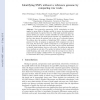Free Online Productivity Tools
i2Speak
i2Symbol
i2OCR
iTex2Img
iWeb2Print
iWeb2Shot
i2Type
iPdf2Split
iPdf2Merge
i2Bopomofo
i2Arabic
i2Style
i2Image
i2PDF
iLatex2Rtf
Sci2ools
139
click to vote
SPIRE
2010
Springer
2010
Springer
Identifying SNPs without a Reference Genome by Comparing Raw Reads
Next generation sequencing (NGS) technologies are being applied to many fields of biology, notably to survey the polymorphism across individuals of a species. However, while single nucleotide polymorphisms (SNPs) are almost routinely identified in model organisms, the detection of SNPs in non model species remains very challenging due to the fact that almost all methods rely on the use of a reference genome. We address here the problem of identifying SNPs without a reference genome. For this, we propose an approach which compares two sets of raw reads. We show that a SNP corresponds to a recognisable pattern in the de Bruijn graph built from the reads, and we propose algorithms to identify these patterns, that we call mouths. We outline the potential of our method on real data. The method is tailored to short reads (typically Illumina), and works well even when the coverage is low where it reports few but highly confident SNPs. Our program, called kisSnp, can be downloaded here: http:/...
| Added | 15 Feb 2011 |
| Updated | 15 Feb 2011 |
| Type | Journal |
| Year | 2010 |
| Where | SPIRE |
| Authors | Pierre Peterlongo, Nicolas Schnel, Nadia Pisanti, Marie-France Sagot, Vincent Lacroix |
Comments (0)

